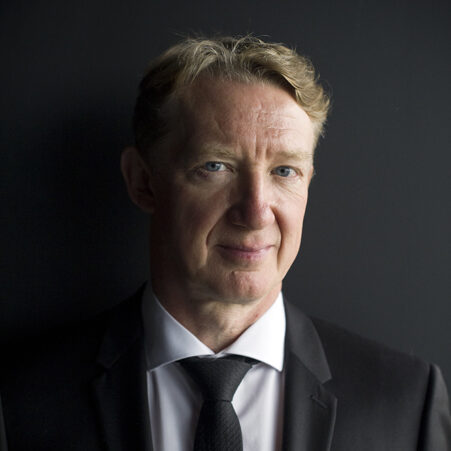New World Symphony presents an invigorating Beethoven Ninth with bonuses

Douglas Boyd led the New World Symphony in music of Beethoven, Janáĉek and Rhiannon Giddens Saturday night at the Arsht Center.
Nothing draws a crowd like Beethoven’s Ninth Symphony and a full house at the Arsht Center on Saturday night greeted the New World Symphony’s performance of this towering masterpiece.
On the podium was British conductor Douglas Boyd. Although best known as a Baroque specialist, Boyd has had a wide- ranging podium career and his realization of Beethoven’s ultimate symphonic achievement proved fresh and invigorating. An outstanding solo quartet and strong choral singing complemented the orchestra’s high-voltage playing.
Although Beethoven’s symphony is often programmed as a single work, Boyd preceded it with two scores from the 20th and 21st centuries. Leos Janáĉek’s Sinfonietta from 1926 heralded the birth of Czechoslovakia as a nation following World War I. It is one of the Czech master’s most nationalistic and affirmative creations. With 13 brass players in the choral loft behind the ensemble, the opening fanfares rang out with precision and supple blending. In “The Castle,” however, with Boyd’ rapid tempo —while incisive and energetic—thematic motifs tended to get lost amid the orchestral hubbub. The entrance of 9 trumpets intoning a sonorous chorale brought some cohesion and stable pulse to the movement.
Boyd’s deliberate pacing of “The Queen’s Monastery” worked surprisingly well, the conductor drawing out Janáĉek’s melodic lyricism. Harp lines emerged with clarity and the horn’s curving turns registered emphatic lift. The brisk, raucous figures of “The Street” sounded like a folk dance gone off the rails. Tense string lines of “The Town Hall” were given emphatic scope and the reprise of the fanfares resounded in clarion fashion. Once a repertoire staple, Janáĉek’s most famous orchestral piece has fallen off the radar in recent years, which made Boyd’s revival and strong interpretive advocacy all the more welcome.
The concert’s post-intermission half opened with tenor Limmie Pulliam as soloist in “Psalm 23” from the 2022 opera Omar by Rhiannon Giddens and Michael Abels.
Giddens is a multi-versatile artist. An acclaimed and award winning pop vocalist and song writer, she is a virtuoso on multiple iterations of the banjo and a musicologist who has researched the history of black string bands, reviving those once-prominent country ensembles.
Her opera tells the story of Omar Ibn Said, an Islamic scholar who was captured in Senegal and enslaved in South Carolina. In this scene, Omar has been given a Bible in Arabic by his slave owner in an attempt to convert him to Christianity. He reads the psalm while commenting on its meaning and his fate.
Giddens’ psalm setting is evocative and colorfully orchestrated, presumably by Abels, a prominent film and concert composer. Pulliam’s ringing dramatic tenor and fierce, passionate declamation vividly conveyed the tragedy of Omar’s situation but his soft tones were particularly striking for their sweetness and honeyed beauty. (Pulliam will be singing the pivotal role of Canio in Florida Grand Opera’s production of Leoncavallo’s Pagliacci later this month.)
Boyd commenced Beethoven’s symphony without pause following the opera excerpt. He offered a Ninth strongly informed by contemporary scholarship and the period instrument movement with crisp tempos, spare vibrato and prominence given to brass and wind lines. His taut version of the initial Allegro ma non troppo maintained urgency throughout the lengthy movement. Every instrumental voice in the Scherzo emerged with x-ray prominence. The trio section flowed gracefully.
The New World musicians’ stalwart orchestral execution reached its peak in the sublime outpouring of the Adagio. Boyd sustained the long melodic arc with a Mendelssohnian lightness and grace. The warmth of tone from the violas in the movement’s second subject was particularly distinctive.
Boyd launched into the opening bars of the finale immediately, with jarring impact to the brass outburst. The “Ode to Joy” melody was initially played by basses and cellos on the edge of audibility, and Boyd built the theme into a stirring climactic proclamation prior to the entrance of soloists and chorus.
South African bass Musa Ngqungwana’s warm, mellow bass and subtle phrasing introduced the call to universal joy and brotherhood. In an exceptionally fine quartet of soloists, soprano Joélle Harvey’s exquisite top and lovely pianissimos stood out. Tenor Pulliam delivered the solo of the alla marcia section with stentorian exuberance and Ronnita Miller’s dark mezzo melded winningly in ensemble moments. Prepared by artistic director Brett Karlin, the Master Chorale of South Florida sang with full- bodied exuberance. In the coda, chorus and players were fully equal to Boyd’s breakneck tempo, radiating life-affirming joyousness.
Cheers and repeated curtain calls greeted Boyd, Karlin and the four soloists in a well-deserved response to a memorable reading of one of the monuments of the symphonic literature. Boyd should return to New World soon. He clearly is a conductor who has individual and well-realized interpretive instincts.
Stéphane Denève conducts the New World Symphony in Roussel’s The Spider’s Feast, Florent Schmitt’s Suite from The Tragedy of Salome and Ravel’s Shéhérazade with mezzo-soprano Isabel Leonard. Molly Turner conducts Ravel’s Alborada del gracioso. 7:30 p.m. January 20 and 2 p.m. January 21 at the New World Center in Miami Beach. nws.edu
Posted in Performances
Leave a Comment
Sun Jan 14, 2024
at 12:34 pm
No Comments





